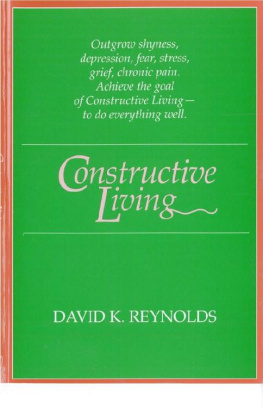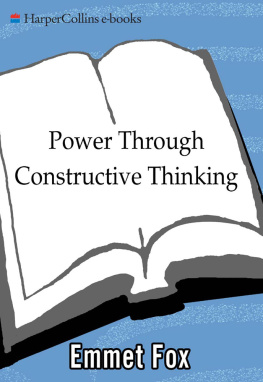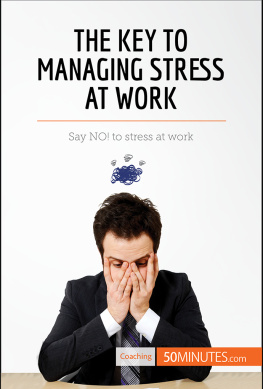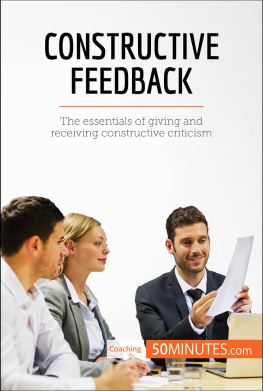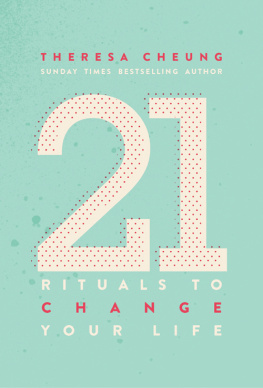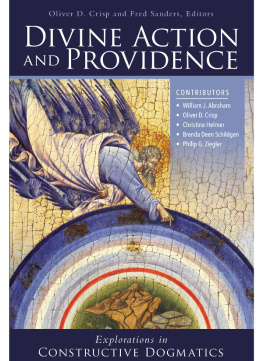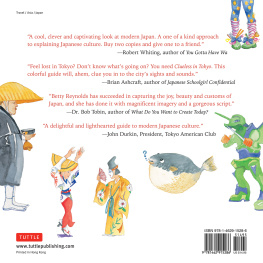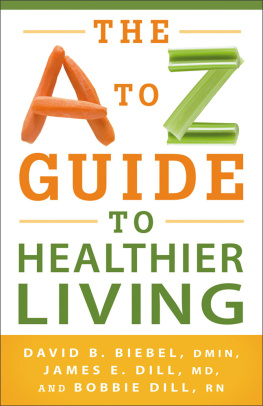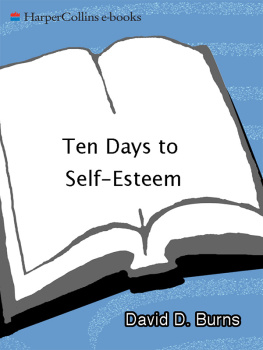A Handbook for
Constructive Living
A Handbook for
Constructive Living
David K. Reynolds, Ph.D.
University of Hawai'i Press
Honolulu
To the readers who buy these books and then kindly loan me your eyes and time and thoughts while reading about Constructive Living. I am in your debt.
Preface
This is not the authoritative single reference work on Constructive Living. Constructive Living doesn't fit in any single book or any series of books. Your life doesn't fit in a photograph or a videotape. Images are deceptive.
The way to find out about Constructive Living is to do the assignments and exercises attentively. You will encounter the depth and breadth of this practical orientation to life. You will see yourself with your possibilities and limitations from a new, and changing, perspective. You will earn this achievement through your own effort, or you won't get it at all.
Perhaps you have already learned the lesson that nothing works for you... except you. It is also true that everything has been working for you right along, but you may not have noticed it. I'm not interested in writing just another book about another life philosophy. I write about the way reality operates. Perhaps you expect me to insert here "or so it seems to me." Of course. And not quite. Check out Constructive Living with your own experience. Don't believe a word in this book without verification from your familiarity with life. If you lack years or life experience to make a judgment about aspects of this lifeway, give yourself some time. But don't wait too long.
I would like you to try a little experiment. In this book you may read statements that sound a bit strange to you at first. It doesn't matter whether you believe what I write or accept it as truth. What does matter is that you consider the possibility that I'm not completely out of my mind and that my mind works pretty much as yours does. I don't think I write anything either foolish or enlightened. I write about how our minds work and how reality works; just ordinary, everyday experience. Please consider what you read here in the light of your own experience and don't dismiss it immediately on the basis of what you have read or been taught somewhere else. You might gain some useful insights and a new perspective on how your mind functions.
The Opportunity for Real Success
There are a lot of pop self-help psychology books in our bookstores. Readers of such books want tips, tricks, special knowledge that will make pain avoidable and life a series of fulfilling highs. The bottom line, however, is that no one lives on a perpetual high and everyone has to live through some pain. Our time is better spent getting done what is important for us to do in life than staying on our guard to bypass suffering. Playing life by the tactics in pop-psychology books can actually distract us from more important purposes and goals.
I am not writing of spartan endurance here. In these pages you will find the strategy that will pay off in greatest life satisfaction. That strategy does not involve minimal misery. It involves maximal accomplishment. Again, don't get me wrong. I'm not suggesting that accumulating money or power or fame or such superficial accomplishments are worth the sacrifice of our lives. I am asserting that when major life goals are built around keeping emotional distress at a minimum and feeling good or confident or joyful or loved or any other delightful mental state, then the real-life payoff won't meet expectations in the long run. Disappointment results, and dissatisfaction.
On the other hand, when we set ourselves behavioral objectives, and do something to achieve them, we run a better chance of both accomplishing our aspirations and also (as a sort of side effect) of keeping unnecessary misery to acceptable limits.
Nevertheless we sometimes feel insecure. The human need for security these days may manifest itself in sleepless nights over the decision to invest in treasury notes or gold, in thoughtful voting for elected governmental representatives, in neighborliness and concern for the institution of marriage and the proper use of cosmetics. What will happen to me tomorrow? What will happen to me in old age? How can I increase the likelihood that I will be safe and prosperous and well and comfortable and cherished? Of course there are no guarantees, whatever our course of action. But every culture is designed to increase the odds of attaining future goals for at least some culture members.
We live in a time and culture with its own characteristic forms of insecurity. When the basics of food, water, and air become dangerous with the potential to kill, we become insecure. Understandably. There can be no perpetual high. However, there can be reasonable living and a flexible, responsive disposition toward life. Constructive Living offers such a possibility.
Just as we now recognize that physical health is a matter of lifestyle (smoking, dieting, exercise, etc.) and not merely a matter of what goes on in a doctor's office, so mental health is not something one achieves merely through psychotherapy. Mental health depends on how one lives every day. Unfortunately in some psychotherapists' offices the clients are hearing worn and outmoded advice about how to live constructively.
Constructive Living developed fundamentally from the thought of Masatake (or Shoma) Morita (1874-1938) and Ishin Yoshimoto (1916-1988). One of the goals of Constructive Living is to shake the foundations of clinical psychology and psychiatry in the West. This goal is accomplished by challenging the assumptions and models that underlie traditional Western psychotherapies. The assumptions we seriously question include the following: feelings need to be and can be repaired, expressing feelings "gets them out" somehow, unfelt feelings exist, "getting in touch with" hidden feelings is possible and useful, professional training confers the ability to understand a client's thoughts and feelings better than the client does, a brief weekly session has more impact on a client's life than the rest of the week, improper parenting is the primary cause of client difficulties, neurosis and alcoholism and obesity are diseases, self-esteem and self-confidence are necessary and useful for a constructive lifestyle, shyness is a disorder, clients can be debilitated by anxiety and other feelings, anyone knows why anyone does anything. Watch any daytime talk show on television and you will see that the above assumptions have trickled down into popular culture. They are taken-for-granted truths. And they are wrong. Simply wrong. Maybe nobody told you that before. I'm telling you now.
Letters from CL Readers
Check out the contents of this book, evaluate it in terms of your own experience, and you will understand why we get thousands of letters like the following:
My husband and I are reading Playing Ball on Running Water for the second time. We are convinced that the Morita lifeway is the way to go about living.... I can readily recognize the benefits of doing what needs to be done since I spent so long not doing it. K.W.
I recently read your book. I truly believe that Morita therapy is a pragmatic approach to helping people achieve what they want in their lives. Thank you. P.G.
I have read Playing Ball on Running Water with great interest and find in many ways my counseling practice incorporates the ideas of Morita therapy you outline. F.H.
Next page

